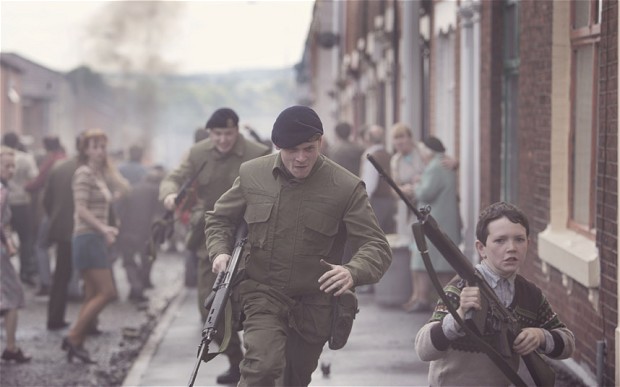You have no items in your cart. Want to get some nice things?
Go shoppingA gripping action thriller set in 1971 Northern Ireland.

“Hold onto your seats!” producer Angus Lamont warned us, as the lights dimmed for the screening of British film ’71 at the Zurich Film Festival, as though we were about to be taken on a white-knuckle ride – and indeed we were. ’71 is a fast-paced, intense thriller that keeps you hanging onto the edge of your seat. Director Yann Demange manages to maintain tension throughout, helped in part by David Holmes’ dramatic music, which seems to ratchet up the tension at just the right moment, the atmospheric production design and the strong casting. Jack O’Connell leads from the front, with his compelling portrayal of young British soldier Gary Hook, sent with his regiment on an urgent peacekeeping assignment to Belfast, Northern Ireland, as it is torn by civil unrest during 1971.
This is the first assignment for the raw recruits – some as young as seventeen – who were expecting to be posted to Germany. Lieutenant Armitage (Sebastian Reid) sends them out onto the dangerous streets of Belfast poorly prepared, wearing their Service Dress uniforms instead of their much-needed riot gear. Belfast is deceptively familiar to the rookies, looking like any other Northern mill town when it’s really an IRA stronghold at the height of the national conflict between the Protestant Loyalists and Catholic Nationalists, resembling any civil war zone like Iraq or Afghanistan. There are scenes of mothers pushing prams past burnt out cars, children lobbing missiles in rubble-filled streets, homemade bombs being rigged up in the back rooms of local pubs and guns hastily retrieved from beneath loose floorboards. The sight of head-scarfed women banging dustbin lids on the pavement as the crowds steadily surge forward in a riot is equally unnerving, a staggering reminder that all is not as it seems on this street that could otherwise be straight from Coronation Street.
Hook and another soldier, Thommo (Jack Lowden), become separated from their group during a routine house search for weapons that escalates into a street riot. They receive a vicious beating: the wounded Hook staggers off alone through the back streets and ends up lost, deep within enemy territory. At one point Hook tries to escape through a terraced house and finds himself running the entire length of a whole block of houses through a labyrinth of passages knocked through the walls, a scene reminiscent of the Syrian civil war documentary Return to Homs (2013) where the young freedom fighter runs through a purpose-built passageway knocked through the bomb damaged apartments.
Hook is befriended by a precocious kid from the Loyalist side, played by Corey McKinley, which provides us with some much-needed comic relief when he boasts about his family connections, saying “Do you know who my uncle is?” to the macho Para-Military grown-ups and swigging unfinished pints of beer at the bar. It begins to feel somewhat contrived when Hook is rescued a second time, this time by Catholic ex-Army medic Eamon (Richard Dormer) and his daughter Brigid (Charlie Murphy) who stitch up his wound and let him recover in the grim block of flats, as fires rage outside and it’s too dangerous for him to leave. At this point screenwriter Gregory Burke could have been tempted to throw in a protracted bed rest and an affair with Brigid, who sits by his bedside, but nothing is allowed to get in the way of the stunning momentum of this film, apart from brief moments of calm in which we, as well as Hook, can regain our breath.
By allowing Hook to be taken in by people on both sides of the conflict we get to see things from both the Loyalist and Catholic sides, which are hard to differentiate. As we agonise over Hook’s desperate attempt to escape, his protracted mental and physical ordeal does not stop as he becomes caught up in the power struggles between the opposing factions and is hunted down by the IRA, the undercover intelligence officers of the Military Reaction Force and his own regiment. We become just as confused as Hook, trying to work out just who is friend and who is foe. This results in Hook being on the run from everyone, not knowing whom he can trust.
There are some superbly menacing performances from David Wilmot as Republican Boyle, Killan Scott as the vicious IRA killer James Quinn and Sean Harris as the weasel-like Captain Browning of the MRF. Meanwhile, O’Connell is so naturally right for the part of Gary Hook it could have been written for him. He previously played troubled youths in This Is England (2006), Harry Brown (2009), teen drama Skins (2007) and created a strong presence as a leading man in the tough prison drama Starred Up (2014). In fact, O’Connell nearly decided to join the British Army and seems to have many aspects in common with Hook, a Derbyshire lad from an unprivileged background who practices boxing and goes to football matches.
There was some risk in producing this film. The cast is mainly unknown outside of Britain (except possibly O’Connell, who is now receiving a lot of international interest) and it is potentially a difficult film to win over even a British audience, being a historical film about Northern Ireland. However, the combination of a good script from acclaimed playwright Burke and sought-after director Yann Demange, who has the ability to convey emotion and depth as well as the action, have made this film a stunning success. This is Demange’s first feature film, having previously directed gritty TV series for the BBC and Channel 4, and it’s an auspicious debut.
The focus of the story is not on the wider political picture, but on the human side of the conflict. There are no news broadcasts or exposition given, which could have slowed down the pace and sense of urgency. We witness events through the eyes of Hook, barely a child himself, naïve of the politics and plunged into the chaos along with all the other youths caught up in the violence, hurling missiles and roaming the streets in gangs. In fact, there is little to separate Hook from the other lads who have effectively enlisted in their own paramilitary groups, like Sean (Barry Keoghan) who has become caught up in the IRA but seems unsure and afraid to fire his gun. This becomes all the more pertinent when Hook removes his military uniform to avoid being identified as a target. His new role as a soldier is tenuous enough but once he has lost his uniform he becomes a vulnerable young man trying to survive on the streets of a city gripped with the terror of a civil war, just like all the other youths.
A combination of locations in Sheffield, Liverpool, Blackburn and Leeds were used to recreate Belfast of the early 1970s, which would have been clogged with smoke from factories and chimneys, at times mixed with fog, tear gas and street fires. The high walls, dimly lit streets and red-bricked terraced houses all provide an intense, darkly oppressive atmosphere, which is helped by the dramatic music from Holmes, who lives in Belfast and felt connected to the story, working closely with Demange on the score.
Although a work of fiction, cinematographer Tad Radcliffe strives for authenticity using widescreen 16mm film to make it reminiscent of the newsreels from that period; night scenes were shot digitally on an Alexa. The chase scenes were filmed using Steadicam, mounted on a motorcycle for very narrow alleys and on a quad bike elsewhere. We follow Hook on the run, scaling walls and running down back alleys. The out-of-focus shots serve to heighten the complete disorientation that Hook suffers in this subterranean world, in which he drifts in and out of consciousness and becomes increasingly lost. Yet as surreal as it occasionally becomes, it never loses its gritty realism and panic-stricken sense of urgency.
The only thing that seems to be lacking is any back-story for Hook. All we get is an admission to having no girlfriend and visits to his younger brother Derren (Harry Verity) who lives in a children’s care home, suggesting they are orphans. This adds to our sense of Hook’s complete derailment and disillusionment with army life, for without the Army, Hook effectively has no home or family to return to. Any back-story, like any exposition, could have held up the plot, slowed the film down and spoiled its stunning momentum.
This is a really visceral 1970s treat, filled with macho men with long hair, moustaches and sideburns and some great atmospheric recreations of Belfast. Demange has excelled at bringing the violent chaos of 1971 Belfast to life with a vivid authenticity. Everything about this film is consistently outstanding, from the great performances, the film sets, to the cinematography. It comes as no surprise that O’Connell has been selected to star in Angelina Jolie’s Hollywood war-drama Unbroken;and ‘71 has already won the Golden Athena, the top award at the 20th Athens International Film Festival this September. See it – it’s worth it.
’71 is in cinemas from Friday 10th October.

About Nicola Hodges
Nicola Hodges is an English writer living in Zürich, Switzerland. She writes short stories, poetry and non fiction and her longer pieces of work are waiting in an orderly queue for her time and attention. Her latest short story has been published in the September/October double issue of "Ellery Queen Mystery Magazine." Find out more about her here: https://nicolahodges.weebly.com




